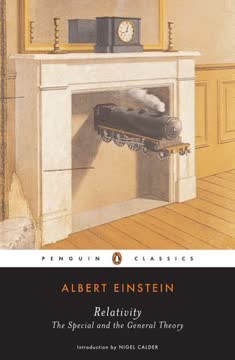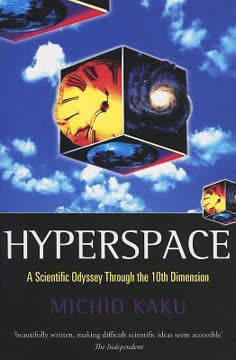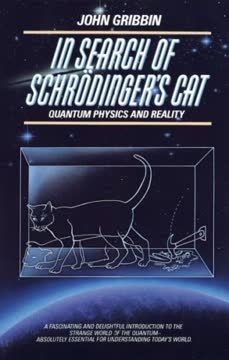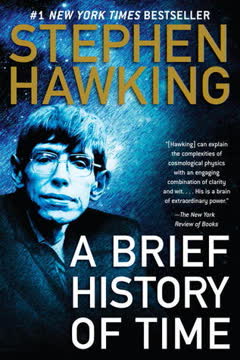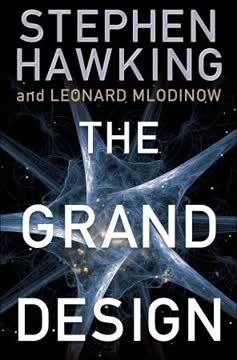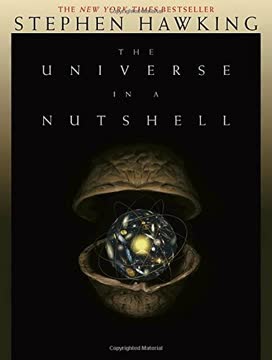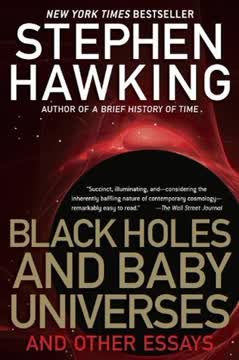Key Takeaways
1. The Universe is Far More Complex and Mysterious Than We Imagine
"What place, then, for a creator?"
Cosmic Complexity Unveiled. Stephen Hawking's work fundamentally challenges our traditional understanding of the universe, revealing it as an intricate, dynamic system far beyond human comprehension. The universe is not a static entity, but a constantly evolving, complex mechanism governed by intricate physical laws.
Key Insights into Universal Complexity:
- The universe operates on scales and principles that defy everyday human experience
- Fundamental physical laws are interconnected in ways we are only beginning to understand
- Our perception of reality is limited by our sensory and cognitive capabilities
Philosophical Implications. The complexity of the universe suggests that our traditional religious and scientific frameworks are insufficient to fully comprehend its nature. Hawking's work implies that the universe might be self-generating, challenging long-held beliefs about creation and divine intervention.
2. Gravity and Expansion Fundamentally Reshape Our Understanding of Cosmic Origins
"An expanding universe does not preclude a creator, but it does place limits on when He might have carried out his job."
Gravitational Dynamics. Hawking explains how gravity is not just a simple attractive force, but a complex phenomenon that shapes the very fabric of spacetime. The expansion of the universe, driven by gravitational interactions, reveals a dynamic cosmic landscape that continuously transforms.
Expansion Mechanisms:
- Galaxies move away from each other at proportional speeds
- Expansion rate determines ultimate universal fate
- Gravitational forces influence cosmic structure formation
Transformative Perspectives. The understanding of universal expansion challenges static cosmic models, suggesting that the universe is not a fixed entity but a continuously evolving system with inherent mathematical and physical principles governing its behavior.
3. Black Holes Challenge Everything We Know About Physics
"Black holes are not as black as they are painted."
Revolutionary Concept. Black holes represent extraordinary cosmic phenomena that challenge traditional understanding of physics. They are not simply massive objects that consume everything, but complex systems that emit radiation and potentially transform our understanding of spacetime.
Black Hole Characteristics:
- Emit radiation (contrary to initial theories)
- Have specific mathematical properties
- Challenge classical physics limitations
- Represent potential gateways to understanding quantum mechanics
Scientific Paradigm Shift. Black holes demonstrate that our current physical theories are incomplete, requiring innovative approaches that integrate quantum mechanics and general relativity.
4. Quantum Mechanics Reveals Profound Insights About Space and Time
"The distinction between time and space disappears completely."
Quantum Revolutionary Perspective. Quantum mechanics introduces radical concepts about the nature of reality, suggesting that time and space are more fluid and interconnected than previously understood. The theory challenges linear perceptions of causality and dimensionality.
Quantum Insights:
- Time can be conceptualized as "imaginary"
- Particle behaviors defy classical deterministic models
- Uncertainty is a fundamental principle of universe
- Observations influence quantum systems
Philosophical Implications. Quantum mechanics suggests that reality is probabilistic rather than deterministic, with fundamental uncertainty embedded in the fabric of existence.
5. The Big Bang is More Than Just a Moment of Creation
"The beginning of time would be a regular smooth point of space-time."
Cosmic Genesis Reimagined. The Big Bang is not a simple explosive event, but a complex quantum mechanical process representing the universe's transition from an indeterminate state to observable existence.
Big Bang Characteristics:
- Emerged from quantum fluctuations
- Followed precise mathematical principles
- Represented a transformation, not a literal "explosion"
- Initial state was highly ordered and uniform
Scientific Nuance. Understanding the Big Bang requires moving beyond simplistic narrative models to comprehend the sophisticated quantum mechanical processes underlying cosmic emergence.
6. Scientific Theories Evolve Through Continuous Questioning
"A scientific theory is just a mathematical model we make to describe our observations."
Scientific Progress Dynamics. Scientific understanding advances not through absolute certainty, but through continuous questioning, challenging existing models, and developing more sophisticated explanations.
Theory Evolution Principles:
- Theories are provisional, not permanent
- Scientific progress requires skepticism
- Mathematical models help explain observations
- Theories get refined with new evidence
Intellectual Humility. Hawking emphasizes that scientific knowledge is always provisional, requiring ongoing investigation and willingness to revise existing understanding.
7. The Search for a Unified Theory of Everything Continues
"Physics, as we know it, will be over in six months."
Theoretical Frontier. The quest for a comprehensive theory explaining all physical interactions remains an ongoing scientific challenge, requiring integration of quantum mechanics, relativity, and other fundamental physical principles.
Unified Theory Challenges:
- Requires reconciling seemingly incompatible theories
- Demands innovative mathematical frameworks
- Necessitates understanding quantum gravitational effects
- Involves complex interdisciplinary research
Intellectual Exploration. The pursuit of a unified theory represents humanity's most ambitious attempt to comprehend universal fundamental principles.
8. Human Perception is Limited in Understanding Cosmic Complexity
"The past is a foreign country. They do things differently there."
Perceptual Constraints. Human cognitive capabilities are inherently limited in comprehending cosmic scales and complex physical phenomena, necessitating sophisticated mathematical and theoretical approaches.
Perception Limitations:
- Sensory systems evolved for survival, not cosmic understanding
- Mathematical models transcend direct observation
- Intuition often misleads in quantum and cosmological domains
Epistemological Insight. Understanding the universe requires transcending immediate sensory experience and developing sophisticated conceptual frameworks.
9. Randomness and Probability Shape Universal Dynamics
"The laws of physics do not distinguish between the past and the future."
Probabilistic Universe. Universal dynamics are fundamentally probabilistic, with uncertainty and random fluctuations playing crucial roles in cosmic evolution.
Probabilistic Principles:
- Quantum mechanics introduces fundamental uncertainty
- Particle behaviors are probabilistic
- Cosmic evolution involves complex statistical processes
Philosophical Implications. Randomness is not absence of order, but a fundamental organizing principle of cosmic complexity.
10. Our Understanding of the Universe is Constantly Transforming
"You cannot predict the future, only the probability of different outcomes."
Dynamic Knowledge Landscape. Scientific understanding of the universe is perpetually evolving, with each discovery revealing new layers of complexity and challenging existing paradigms.
Knowledge Evolution Characteristics:
- Scientific models are continuously refined
- New technologies enable deeper observations
- Interdisciplinary approaches generate novel insights
- Intellectual humility is crucial for progress
Continuous Learning. The universe remains an open book, with each scientific breakthrough offering glimpses into its profound, mysterious nature.
Last updated:
FAQ
What's "The Theory of Everything: The Origin and Fate of the Universe" about?
- Overview: The book, authored by Stephen Hawking, explores the history and future of the universe, from the big bang to black holes.
- Content Structure: It is structured as a series of lectures that cover various cosmological concepts and theories.
- Main Themes: The book delves into the nature of the universe, the laws of physics, and the quest for a unified theory that explains everything.
- Purpose: It aims to make complex scientific ideas accessible to a general audience, providing insights into the workings of the universe.
Why should I read "The Theory of Everything: The Origin and Fate of the Universe"?
- Understanding the Universe: It offers a comprehensive overview of the universe's history and future, making it essential for anyone interested in cosmology.
- Accessible Science: Hawking presents complex scientific concepts in an understandable manner, making it suitable for readers without a scientific background.
- Intellectual Curiosity: The book stimulates curiosity about the fundamental questions of existence and the universe.
- Influential Work: As a work by Stephen Hawking, it provides insights from one of the most renowned physicists of our time.
What are the key takeaways of "The Theory of Everything: The Origin and Fate of the Universe"?
- Big Bang and Black Holes: The book explains the origins of the universe with the big bang and the nature of black holes.
- Unified Theory: It discusses the quest for a unified theory that combines quantum mechanics and general relativity.
- Time and Space: Hawking explores the concepts of time, space, and the possibility of a universe without boundaries.
- Scientific Inquiry: The book emphasizes the importance of scientific inquiry and the ongoing search for understanding the universe.
What are the best quotes from "The Theory of Everything: The Origin and Fate of the Universe" and what do they mean?
- "The universe would be neither created nor destroyed. It would simply be." This quote reflects the idea of a self-contained universe without a beginning or end.
- "The boundary condition of the universe is that it has no boundary." It suggests a universe that is finite yet unbounded, challenging traditional notions of time and space.
- "If we find the answer to that, it would be the ultimate triumph of human reason." This highlights the pursuit of a complete understanding of the universe as a pinnacle of human achievement.
- "The past is a foreign country. They do things differently there." This quote, borrowed from L.P. Hartley, underscores the book's exploration of time's direction and nature.
How does Stephen Hawking explain the Big Bang in "The Theory of Everything"?
- Initial Singularity: Hawking describes the big bang as a singularity where the universe's density and temperature were infinite.
- Expansion: He explains that the universe has been expanding since the big bang, leading to the formation of galaxies and stars.
- Time's Beginning: The big bang marks the beginning of time, as events before it have no observational consequences.
- Scientific Evidence: Hawking supports the big bang theory with evidence such as cosmic microwave background radiation.
What is the significance of black holes in "The Theory of Everything"?
- Gravitational Collapse: Black holes are formed when massive stars collapse under their own gravity, creating regions from which nothing can escape.
- Event Horizon: The boundary of a black hole, known as the event horizon, marks the point beyond which escape is impossible.
- Hawking Radiation: Hawking introduces the concept of black holes emitting radiation, challenging the notion that they are completely black.
- Cosmic Mysteries: Black holes are central to understanding the universe's structure and the laws of physics.
What is the "no boundary" proposal in "The Theory of Everything"?
- Finite but Unbounded: The proposal suggests that the universe is finite in extent but has no boundaries, similar to the surface of the Earth.
- Imaginary Time: It involves the concept of imaginary time, where time and space are indistinguishable, eliminating singularities.
- Self-Contained Universe: The universe is self-contained, without the need for external creation or destruction.
- Implications for Creation: This challenges traditional views of creation, suggesting a universe that simply exists.
How does "The Theory of Everything" address the concept of time?
- Time's Direction: Hawking explores why time seems to have a direction, known as the arrow of time, linked to the universe's expansion.
- Thermodynamic Arrow: The increase of disorder or entropy over time gives time its direction.
- Psychological Arrow: Our perception of time aligns with the thermodynamic arrow, as we remember the past but not the future.
- Cosmological Arrow: The universe's expansion provides a cosmological arrow of time, influencing the other arrows.
What role does quantum mechanics play in "The Theory of Everything"?
- Uncertainty Principle: Quantum mechanics introduces the uncertainty principle, affecting the predictability of events.
- Quantum Gravity: Hawking discusses the need for a quantum theory of gravity to understand the universe's early stages.
- Virtual Particles: The concept of virtual particles and their role in black hole radiation is explored.
- Unified Theory: Quantum mechanics is essential in the quest for a unified theory that combines all fundamental forces.
How does Stephen Hawking approach the search for a unified theory in "The Theory of Everything"?
- Grand Unified Theories: The book discusses theories that combine the weak, strong, and electromagnetic forces but not gravity.
- Challenges: The main challenge is integrating gravity, described by general relativity, with quantum mechanics.
- String Theory: Hawking explores string theory as a potential framework for a unified theory.
- Ultimate Goal: The search for a unified theory aims to provide a complete understanding of the universe's laws.
What is the anthropic principle as discussed in "The Theory of Everything"?
- Human-Centric View: The anthropic principle suggests that the universe's properties are as they are because they allow for the existence of intelligent life.
- Selection Principle: It implies that we observe the universe in a way that supports life because we are here to observe it.
- Cosmological Implications: The principle is used to explain why the universe appears fine-tuned for life.
- Philosophical Considerations: It raises questions about the role of observers in defining the universe's characteristics.
How does "The Theory of Everything" explore the relationship between science and philosophy?
- Scientific Inquiry: Hawking emphasizes the importance of scientific inquiry in understanding the universe.
- Philosophical Questions: The book addresses philosophical questions about existence, creation, and the nature of reality.
- Limits of Science: It acknowledges the limits of scientific models in answering "why" questions about the universe.
- Interdisciplinary Dialogue: Hawking encourages dialogue between science and philosophy to explore fundamental questions.
Review Summary
The Theory of Everything is praised for its accessible explanation of complex cosmological concepts, though some readers found it challenging without prior physics knowledge. Hawking's wit and humility are appreciated. The book covers the universe's origins, black holes, and the search for a unified theory. Many reviewers recommend it for those interested in astronomy and physics, noting its concise yet comprehensive nature. Some suggest multiple readings may be needed to fully grasp the content.
Similar Books
Download PDF
Download EPUB
.epub digital book format is ideal for reading ebooks on phones, tablets, and e-readers.

